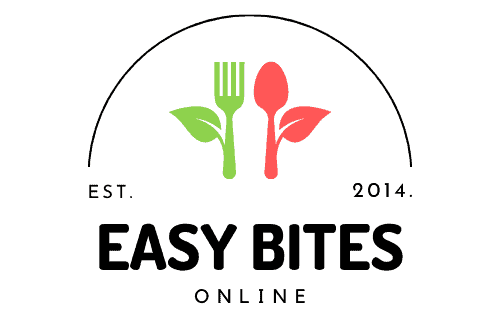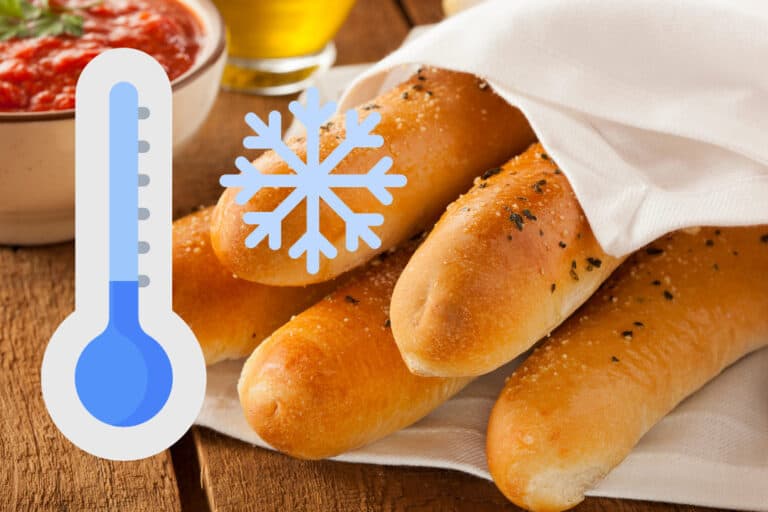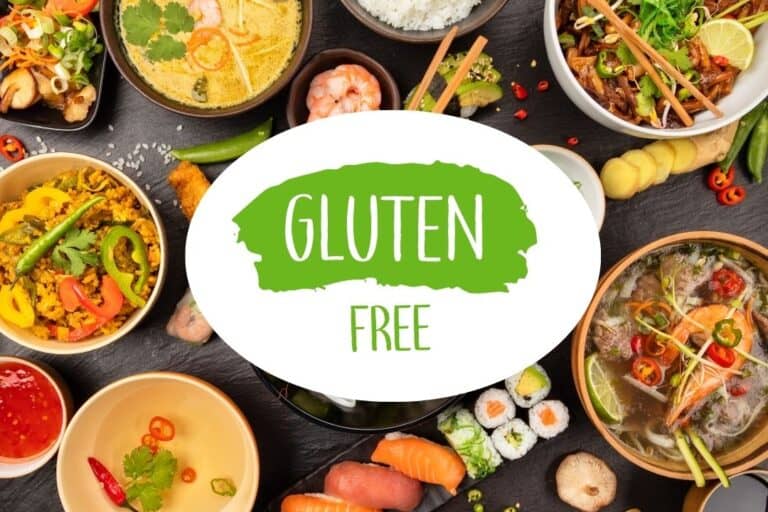Is Gluten Free Pasta Kosher for Passover Noodles
In recent years, the Jewish holiday of Passover has seen a significant change in traditional foods due to the rise of gluten-free products.
The religious practice of avoiding leavened bread products during Passover seders means Ashkenazi Jews typically exclude foods like wheat, gluten, grains, and certain legumes like chickpeas. However, gluten-free status is becoming more prevalent in the evolving kosher market.
If you push your shopping cart through the kosher food aisles during this time of the year, alongside gefilte fish, kosher meats, and elite chocolates, you’ll notice a range of gluten-free alternatives.
Gone are the times of the year when the only pasta choice for the Passover diet was potato starch noodles. Now, rice noodles, rice pasta & grains like Passover couscous & quinoa, and other gluten-free grains appear.
Tapioca starch and potato flakes are common ingredients in gluten-free products, providing a fitting alternative to the more traditional meal & farfel. These options make it easier for those who either choose or medically need to avoid gluten during the holiday.
Kosher companies have risen to the challenge by offering products from cookie chips to gluten-free matzah and latke mixes.
But is gluten-free pasta truly kosher for Passover noodles? The select code of kosher products, or the “link code text” as some refer to it, is vital. As one would use a code selection for a software program, ensuring the gluten-free product meets Passover standards is essential.
Not all gluten-free products, like bread, rice, pasta & gra, are automatically kosher for Passover.
Take, for instance, the case of Avi G., a resident of the United States. He was thrilled to find free elbows and thin noodles in his local kosher market. But, after a closer look, he realized not all were certified for Passover.
Some might contain ingredients like soy sauce or Chinese sauces, which are not necessarily in line with the Passover guidelines.
Thus, while planning your Passover recipes, be cautious. Kosher cookies, dairy products like kosher cheese, kosher yogurts, and even cream cheese can be found in gluten-free versions.
However, the challenge lies in ensuring these gluten-free products adhere to the Passover standards. Your shopping cart item list may include fresh fruits, dry fruits, chocolate spreads, chocolates, chocolate bars, and even bakery cakes, but always ensure they are certified for Passover.
Besides food, household products like dish soap, oven cleaners, and even water dispensers must be considered during the holiday. Some even look for gift baskets, gourmet bakery, or holiday challahs as a special treat.
Your side dish of potato starch noodles could be complemented with toppings or fillings made from kosher cheeses, dairy products, or kosher meats. For the main course, consider the Passover fish department for Passover canned tuna.
Soup mixes and Passover soup consumme enhanced with spices can be an inviting starter. Do not forget the chocolate! Elite chocolates, snacks, candies, and even chocolate spreads can satisfy the sweet tooth.
In conclusion, while gluten-free pasta offers an excellent alternative for those avoiding gluten, always ensure its kosher-for-Passover status. It’s always best to quote item ingredients, check certifications, and consult trusted sources before adding them to your meal during this sacred time.
Whether it’s a simple meal with soup spices, medium heat dishes from the Middle East, or a filling mixture for your matzo ball, ensure it aligns with the religious practice of this vital Jewish holiday.
Jewish Dietary Laws and the Concept of Kosher

Jewish dietary laws, known as kashrut, play a significant role in the lives of observant Jews. During Passover, it is essential to follow these laws when choosing Passover foods, such as matzah meal. To help with this, you can find free matzah or matzo to include in your Passover preparations.
These laws, rooted in ancient religious texts like the Torah, dictate what foods like matzah and chicken are permissible for consumption. They have been followed for centuries and are still observed today.
The guidelines also cover the use of water during the year. However, Kosher Passover foods are more than just a list of ingredients; they also encompass preparation methods and utensils. Matzah, water, and other Passover foods are essential for celebrating the holiday each year.
Keeping kosher during Passover adds an extra layer of complexity, especially when it comes to the consumption of matzah. Every year, many people struggle to find suitable alternatives and recipes that adhere to strict dietary restrictions.
However, enjoying a delicious and satisfying Passover meal is possible with careful planning and preparation. If you have any questions or need further information, please don’t hesitate to reply to this post.
Chametz (leavened bread or products containing leavening agents) is strictly prohibited during Passover. Matzah is one of the traditional Passover foods. Please reply if you have any questions.
As a result, traditional wheat-based pasta, commonly consumed during Passover as one of the forbidden Passover foods, is off-limits. So, if you were planning to make spaghetti for your Seder, you might want to reply with a resounding “no” and opt for matzah instead. But what about gluten-free pasta? Is it kosher for Passover?
Gluten-Free Pasta: A Kosher Option for Passover Noodles?
Gluten-free pasta can be a viable alternative to matzah for those seeking kosher options during Passover. Those with dietary restrictions can enjoy it, which provides a delicious reply to the traditional matzah.
Since it doesn’t contain chametz ingredients like wheat or other grains that rise when combined with water, it meets the criteria for being free from leavening agents. In addition, if you have any questions or concerns about this topic, please reply to this blog post.
However, it’s essential to consider a few factors when determining if gluten-free pasta is kosher for Passover. One of these factors is whether or not it is genuinely kosher for Passover.
Ingredients: Check the label carefully to ensure that the gluten-free pasta does not contain chametz-derived ingredients such as wheat starch or barley flour. Don’t forget to reply if you have any questions or concerns.
Look for certified kosher-for-Passover symbols on packaging to guarantee compliance with dietary regulations. If you have any questions or need further information, please don’t hesitate to reply.
Certification: When looking for Passover products, it is essential to seek out products certified by reputable kosher certification agencies specializing in Passover supervision.
These certifications ensure that the manufacturing processes and ingredients meet strict standards by Jewish law.
Preparation: Even if you find gluten-free pasta labeled as kosher for Passover, it’s crucial to prepare it according to the rules of kashrut during this holiday season. Use separate pots and utensils designated for Passover use to avoid cross-contamination with non-kosher foods.
Tradition and Customs: While gluten-free pasta may be technically permissible, it’s essential to consider the customs and traditions of your specific Jewish community. Some communities may have additional restrictions or guidelines for Passover observance that go beyond the basic kosher requirements.
Exploring Other Kosher Options for Passover Noodles
If you’re looking to diversify your Passover noodle options beyond gluten-free pasta, there are several alternatives worth exploring:
- Matzo Meal: Ground matzo (unleavened bread), including noodle dishes, is popular in Jewish cooking. Matzo meal can be used to create tasty and kosher-for-Passover noodles.

- Vegetable Noodles: Spiralized vegetables like zucchini or sweet potatoes can be a creative and healthy substitute for traditional pasta during Passover.
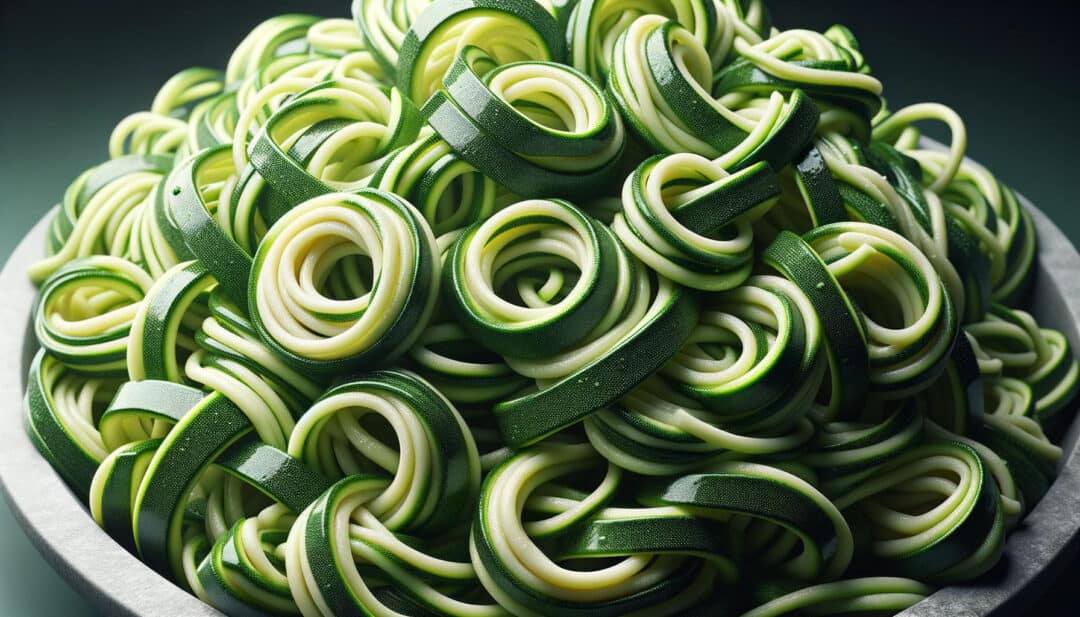
- Kugel: This traditional Jewish dish with egg noodles, eggs, and various fillings offers a flavorful option for those seeking a taste of tradition during Passover.
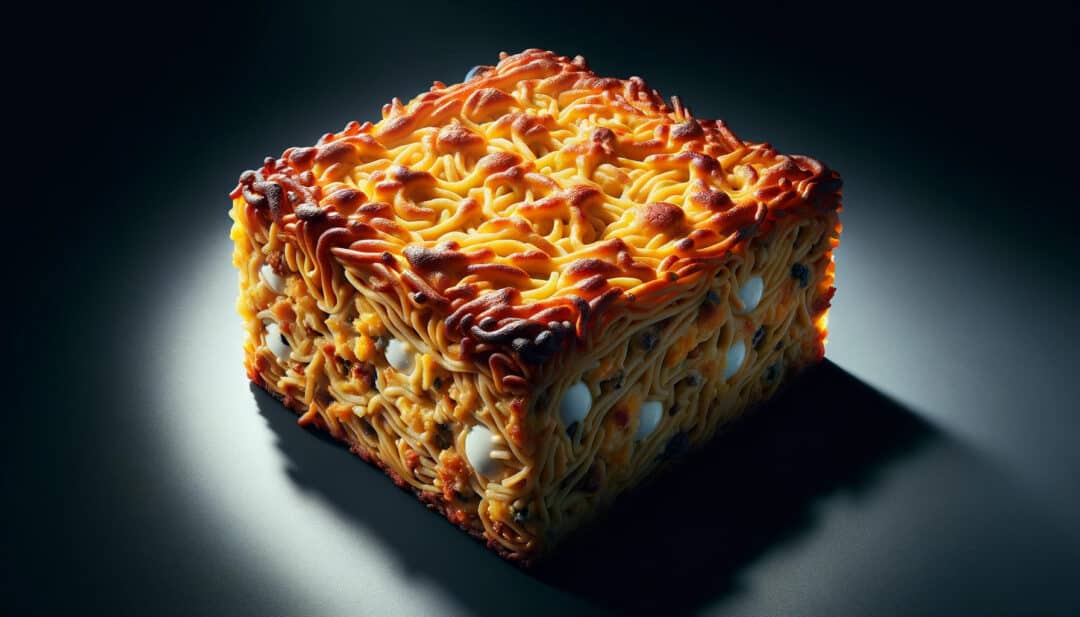
Remember, Consulting with a knowledgeable authority or rabbi within your community can provide valuable guidance tailored to your needs.
By understanding the concept of kosher and exploring alternative options like gluten-free pasta or other kosher ingredients, you can enjoy delicious meals while adhering to the spiritual significance of Passover.
Exploring Gluten-Free Pasta Options for Passover
During Passover, individuals with dietary restrictions seek alternatives to traditional wheat-based pasta. This is especially true for those who follow Jewish Dietary Laws and kosher guidelines.
Fortunately, the rise in popularity of gluten-free pasta has provided a suitable option for those looking to enjoy noodles during this holiday season.
Gluten-free pasta has gained significant traction among people with gluten sensitivities or celiac disease. It eliminates wheat flour, which contains gluten proteins that can cause adverse reactions in some individuals.
As a result, many brands have introduced gluten-free pasta options made from alternative grains or legumes.
One popular choice for gluten-free pasta during Passover is rice-based noodles. Rice flour is an excellent substitute for traditional wheat flour and offers a similar texture when cooked.

Corn-based pasta is another viable option, providing a unique flavor profile that complements various dishes.
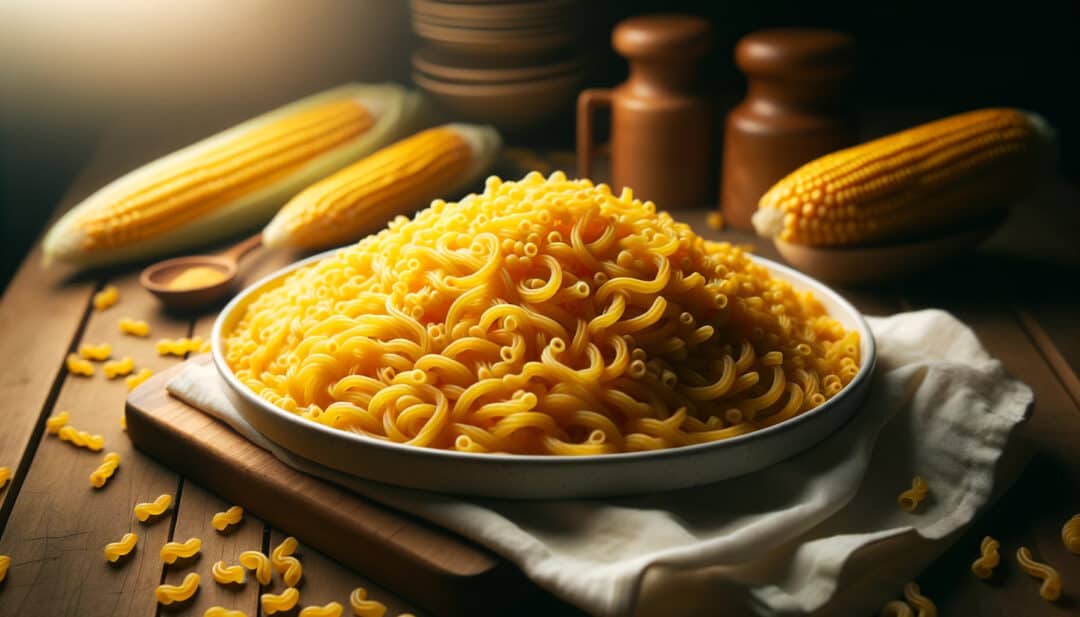
Quinoa-based pasta has also become a favorite among health-conscious individuals seeking gluten-free alternatives. Quinoa is packed with nutrients and adds a pleasant, nutty taste to dishes.

Legume-based pasta, such as lentil or chickpea noodles, are high in protein and fiber while offering a satisfying texture.

There are several approaches one can take:
Using Gluten-Free Matzo Meal
Some brands offer gluten-free matzo meals designed explicitly for Passover use. This matzo meal can be used as an ingredient in homemade gluten-free pasta dough. Combining the matzo meal with other ingredients like eggs and water can create fresh pasta dough suitable for Passover consumption.
Substituting with Vegetable Noodles
- If you prefer a lighter alternative to traditional noodles, consider using vegetable “noodles.”
- Spaghetti squash is an excellent option; once cooked, its flesh naturally separates into spaghetti-like strands.
- Zucchini can also be spiralized to create “zoodles,” which can be cooked and served as a pasta substitute.
Exploring Other Passover-Friendly Options
Potato starch is often used in Passover cooking and can be utilized to make gluten-free pasta dough. Some brands offer pre-made gluten-free matzo or matzah that can be crumbled and used as a base for dishes like lasagna or casseroles.
Recipes for alternative flours, such as almond or coconut flour, are available to create unleavened bread suitable for Passover.
Can Regular Pasta Be Considered Kosher for Passover?
During the Passover holiday, those who observe strict kosher guidelines need to be mindful of the ingredients they consume. Unfortunately, regular pasta made from wheat flour does not meet the criteria to be considered kosher for Passover.
This is due to its chametz status, which refers to leavened products prohibited during this period.
Wheat-based regular pasta contains chametz ingredients such as yeast or other leavening agents. These ingredients cause the dough to rise and ferment, resulting in a product that cannot be consumed by those observing Passover according to strict Jewish dietary laws.
The chametz prohibition during Passover stems from the biblical commandment of not consuming leavened bread during the holiday. Instead, matzah (unleavened bread) is eaten as a symbolic representation of the haste in which the Israelites left Egypt.
Regular pasta undergoes a process that involves fermentation and rising due to the presence of yeast or other leavening agents. As a result, it becomes unsuitable for consumption during Passover because it violates these dietary restrictions.
It’s essential for individuals observing Passover to understand that regular pasta made from wheat flour should not be consumed during this holiday period if they wish to adhere strictly to kosher guidelines.
However, alternatives are available for gluten-free options or noodles labeled kosher for Passover.
Various types of gluten-free pasta are available today for individuals who require gluten-free options or follow specific dietary restrictions. These alternatives offer an excellent solution for those seeking non-chametz options during Passover.
When selecting gluten-free pasta options for Passover, it’s crucial to ensure they are labeled “kosher for Passover” or have appropriate certifications indicating their suitability for consumption during this holiday period.
Requirements for Gluten-Free Pasta to be Kosher for Passover
To ensure that gluten-free pasta is considered kosher for Passover, it must meet specific Jewish dietary laws and guidelines. These requirements encompass both the ingredients used in the pasta and the manufacturing process itself.
Ingredients without Chametz or Kitniyot
One of the critical criteria for gluten-free pasta to be kosher for Passover is that it should not contain chametz or kitniyot. Chametz refers to leavened products made from wheat, barley, rye, oats, or spelt that have come into contact with water and been left to rise. Kitniyot includes legumes such as beans, peas, lentils, and rice.
- Gluten-free pasta suitable for Passover will be made from alternative flour like potato starch or matzo meal.
- It will not contain any grains or legumes considered chametz or kitniyot.
- Manufacturers may combine different non-grain flours to create a suitable texture and taste.
Adherence to Kosher Standards in Manufacturing Process
In addition to using appropriate ingredients, the manufacturing process of gluten-free pasta must adhere to kosher standards. This ensures that there is no cross-contamination with non-kosher products during production.
- Facilities producing kosher-for-Passover gluten-free pasta will have dedicated equipment and separate production lines.
- Stringent cleaning procedures are followed before switching between regular and Passover production runs.
- The entire process is overseen by qualified personnel who ensure compliance with kosher guidelines.
Certification and Symbol Identification
Gluten-free pasta certified as kosher for Passover will bear appropriate symbols or certifications on their packaging. These symbols indicate that the product has been thoroughly inspected and meets all requirements.
- Look for well-known kosher certification symbols such as OU-P (Orthodox Union – Pesach) or KFP (Kosher for Passover).
- These symbols assure that the gluten-free pasta has been produced following Jewish dietary laws.
- It is essential to check for these symbols on the packaging to ensure the product is suitable for consumption during Passover.
Manischewitz Gluten-Free Wide Egg Noodles: A Versatile Option

Manischewitz offers a fantastic solution for those seeking gluten-free options during Passover with their wide egg noodles. These noodles are specially designed to meet the requirements of Passover and are made from a blend of potato starch and tapioca flour, ensuring that they are chametz-free.
Made for Passover: Gluten-Free and Kosher
One of the most critical factors. Manischewitz’s gluten-free wide egg noodles check both boxes. They are carefully crafted to be free from any traces of wheat or grains that contain gluten, making them suitable for individuals following a gluten-free diet.
These noodles are also certified to be kosher for Passover by reliable authorities. This certification ensures that the noodles have been produced according to strict kosher guidelines, giving consumers peace of mind when incorporating them into their Passover meals.
Versatility in Passover Dishes
Manischewitz’s gluten-free wide egg noodles offer versatility in preparing various traditional Passover dishes. Whether you’re looking to make a delicious kugel or a comforting bowl of noodle soup, these noodles provide an excellent base.
Here are some examples:
- Kugel: Create a savory or sweet kugel using Manischewitz’s wide egg noodles as the main ingredient. Add your favorite vegetables, herbs, or spices to make a flavorful dish.
- Soup: Use these gluten-free egg noodles in your homemade chicken soup or vegetable broth for a satisfying and nourishing meal during Passover.
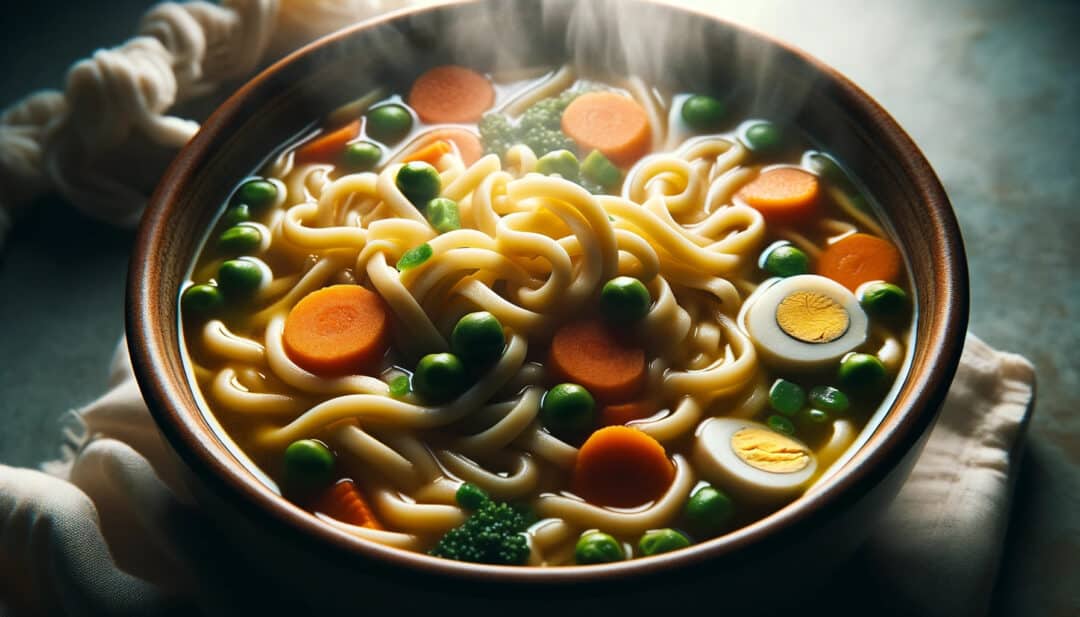
Convenient Packaging and Availability
Manischewitz packages their gluten-free wide egg noodles in convenient resealable bags, making it easy to store any leftovers without worrying about freshness. The packaging ensures the noodles remain intact until you’re ready to use them again.
These noodles are widely available in stores, both online and offline. You can easily find them at your local grocery store or order them from online retailers. This accessibility allows you to enjoy the convenience of gluten-free pasta without any hassle during Passover.
Other Brands Offering Gluten-Free Pasta for Passover
In addition to Manischewitz, several other brands offer gluten-free pasta options for Passover. These brands, including Gefen, Yehuda, and Streit’s, are well-known for their commitment to producing kosher products.
Popular Brands with Gluten-Free Options
Gefen is a popular brand that offers a variety of gluten-free pasta options for Passover. Their range includes spaghetti, penne, and lasagna sheets from alternative grains such as corn and rice.
Yehuda is another brand that caters to those seeking gluten-free pasta options during Passover. They provide a selection of grain alternatives like quinoa and legume-based pastas.
These options allow individuals with dietary restrictions to enjoy traditional pasta dishes without compromising taste or texture.
Streit’s is also recognized for its commitment to producing high-quality kosher products. They offer gluten-free pasta varieties suitable for Passover, giving consumers more choices.
Variety in Gluten-Free Pasta Options
Consumers have a wide range of choices available from these brands. Whether you prefer spaghetti, penne, or lasagna sheets, there is an option that suits your culinary needs and preferences.
The availability of different grain alternatives further enhances the variety offered by these brands. Corn-based pasta can provide a slightly sweet flavor profile, while rice-based pasta offers a neutral taste that pairs well with various sauces and toppings.
Quinoa-based pasta brings added nutritional benefits due to the grain’s high protein content, making it an excellent choice for health-conscious individuals.
Legume-based pasta is another option worth considering, as they are not only gluten-free but also packed with fiber and protein. Lentil or chickpea-based pasta can add a hearty element to your meals while keeping them suitable for Passover.
Meeting Dietary Restrictions
These brands provide a convenient solution during Passover for individuals with gluten sensitivities or those following a gluten-free diet. Individuals can still enjoy their favorite pasta dishes without compromising their dietary restrictions by choosing gluten-free pasta options.
Moreover, the availability of kosher-certified gluten-free pasta ensures that these products adhere to the strict guidelines and requirements set forth by Jewish dietary laws.
This gives consumers peace of mind, knowing they are consuming products that meet their dietary needs and religious observances.
Viability of Gluten-Free Pasta for Passover Noodles
In conclusion, when considering gluten-free pasta as an option for Passover noodles, it is essential to ensure that it meets the requirements of Jewish dietary laws.
While regular pasta cannot be considered kosher for Passover due to its use of leavening agents, gluten-free pasta can be a suitable alternative. However, not all gluten-free pastas are automatically kosher for Passover.
It is crucial to look for specific certifications or symbols indicating that the product meets the necessary standards.
One brand that offers a versatile option for gluten-free pasta during Passover is Manischewitz’s Gluten-Free Wide Egg Noodles. These noodles are made with high-quality ingredients and adhere to strict kosher guidelines.
They provide a satisfying texture and can be used in traditional dishes without compromising taste or religious observance.
For those seeking additional options, other brands offer gluten-free pasta certified explicitly as kosher for Passover. Exploring these options can give individuals a broader range of choices when preparing meals for this significant holiday.
FAQs – Is gluten free pasta kosher for Passover?
Can I use any gluten-free pasta for Passover?
👉 Not all gluten-free pastas are suitable for Passover. It is essential to look for specific certifications or symbols indicating that the product meets the necessary standards set by Jewish dietary laws.
What makes Manischewitz Gluten-Free Wide Egg Noodles a good choice?
👉 Manischewitz Gluten-Free Wide Egg Noodles are made with high-quality ingredients and adhere to strict kosher guidelines. They offer a versatile option for various traditional dishes without compromising taste or religious observance.
Are there other brands offering gluten-free pasta for Passover?
👉 Yes, besides Manischewitz, other brands offer gluten-free pasta certified explicitly as kosher for Passover. Exploring these options gives individuals more choices when preparing meals during this significant holiday.
How do I know if gluten-free pasta is kosher for Passover?
👉 Look for specific certifications or symbols on the packaging that indicate the product’s compliance with Jewish dietary laws for Passover. These certifications assure consumers that the gluten-free pasta meets the necessary standards.
Can I use regular pasta for Passover if it is gluten-free?
👉 No, regular pasta, even if it is gluten-free, cannot be considered kosher for Passover due to its use of leavening agents. It is essential to choose specifically certified gluten-free pasta that meets the requirements of Jewish dietary laws.

Born and raised in a family of foodies, Georgia’s passion for cuisine was nurtured from a young age as she learned the intricacies of flavor and texture from her grandmother’s kitchen. As an adult, this early fascination blossomed into a full-fledged love affair with the culinary world.
